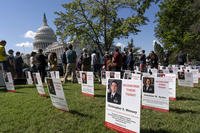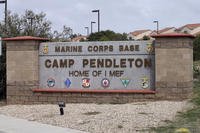KADENA AIR BASE, OKINAWA, Japan -- Marine Sgt. Ricardo S. Scales and Cpl. Christopher R. Oliver graduated from the Airman Leadership School Oct. 25 at the Rocker NCO Club on Kadena Air Base.
Scales and Oliver are the first Marines to attend the Airman Leadership School, held at the Erwin Professional Military Education Center, in six years.
ALS is a five-week long program designed to educate Air Force senior airmen and staff sergeants, and develop effective and efficient noncommissioned officers and leaders.
The course is the Air Force equivalent to the Marine Corps’ Corporals Course and Sergeants Course, according to Air Force Master Sgt. Mark C. James, the ALS commandant. The students learn combat leadership skills, military professionalism, public speaking techniques and ways to lead by example.
“It’s been six years since we’ve last had (a joint-service enrollment),” said James. “The opportunity to educate jointly doesn’t happen often. (Serving on) Okinawa is such a unique situation that we can afford to do that.”
Scales is an air support operations operator with Marine Air Support Squadron 2, Marine Air Control Group 18, 1st Marine Aircraft Wing, III Marine Expeditionary Force.
Oliver is a crew master for the KC-130J Hercules with Marine Aerial Refueler Transport Squadron 152, Marine Aircraft Group 36, 1st MAW, III MEF.
“Ten years ago, our curriculum had zero joint (service) discussion,” said James. “Today, 25 percent of our curriculum is nothing but joint (service); how the military is organized on a national level, how we deploy and ready our troops on a joint scale, and how we fight and win America’s wars on a joint level.”
With the addition of joint service education to the curriculum, the schools next logical step was to invite NCOs from other branches of service to join the course, according to James.
“To have airmen sit around and talk about the joint services without that perspective isn’t as effective,” said James. “It was great to have the Marines in there to give their point of view.”
The instructors and curriculum challenged the Marines, while introducing them to leadership techniques that work with other branches of the military, according to James.
“I enjoyed it; it was different from a Marine Corps course,” said Scales. “It’s structured like a college course, there was a lot of studying on your own and pop quizzes.”
The focus on academics increased the university atmosphere of the course, according to Oliver.
“With our military doing a lot of joint service operations, this course gives a background of how airmen, sailors and soldiers operate,” said Scales. “It gives them that added dimension.”
With modern military operations requiring all services to operate cooperatively, all Marines would benefit from learning how to work with and lead other services, according to Oliver.
“Marines and airmen are working together along with sailors and soldiers, that’s the joint organization that we’re becoming,” said Oliver. “You have to keep an open mind, and that’s what they teach in this course. To be willing to understand how other (services) think helps everyone.”



























